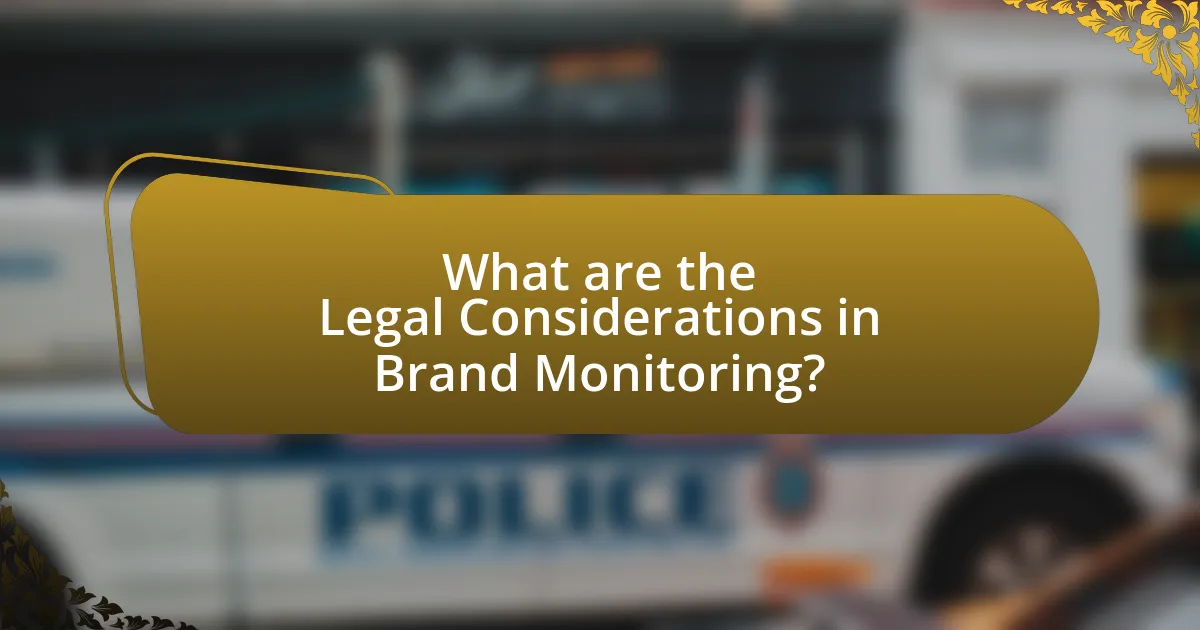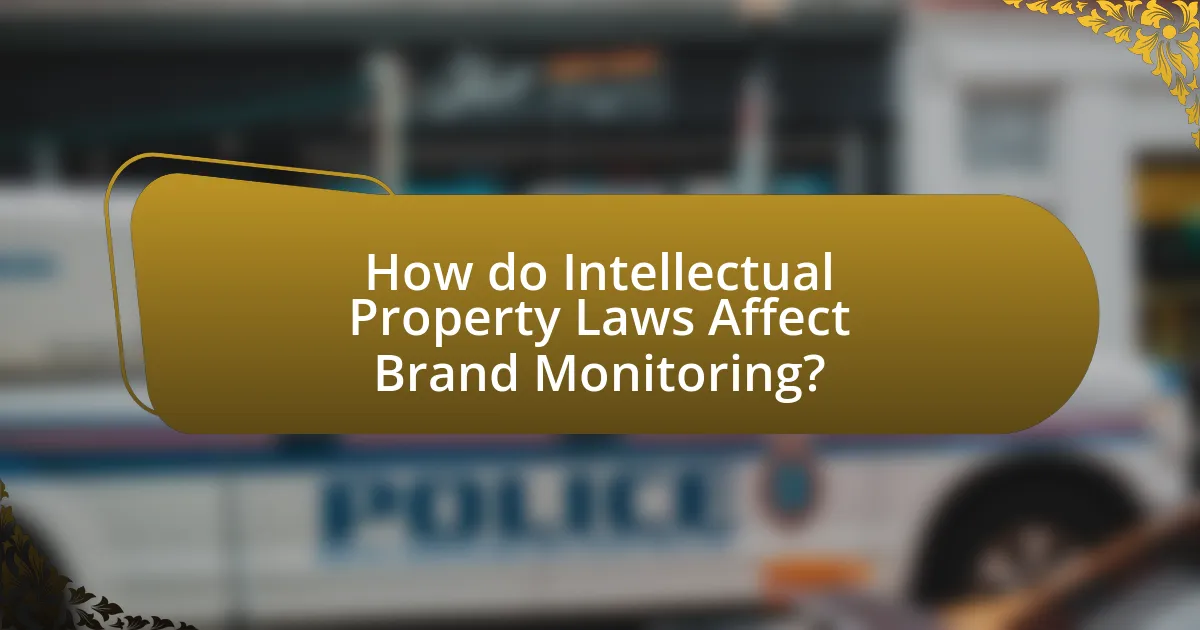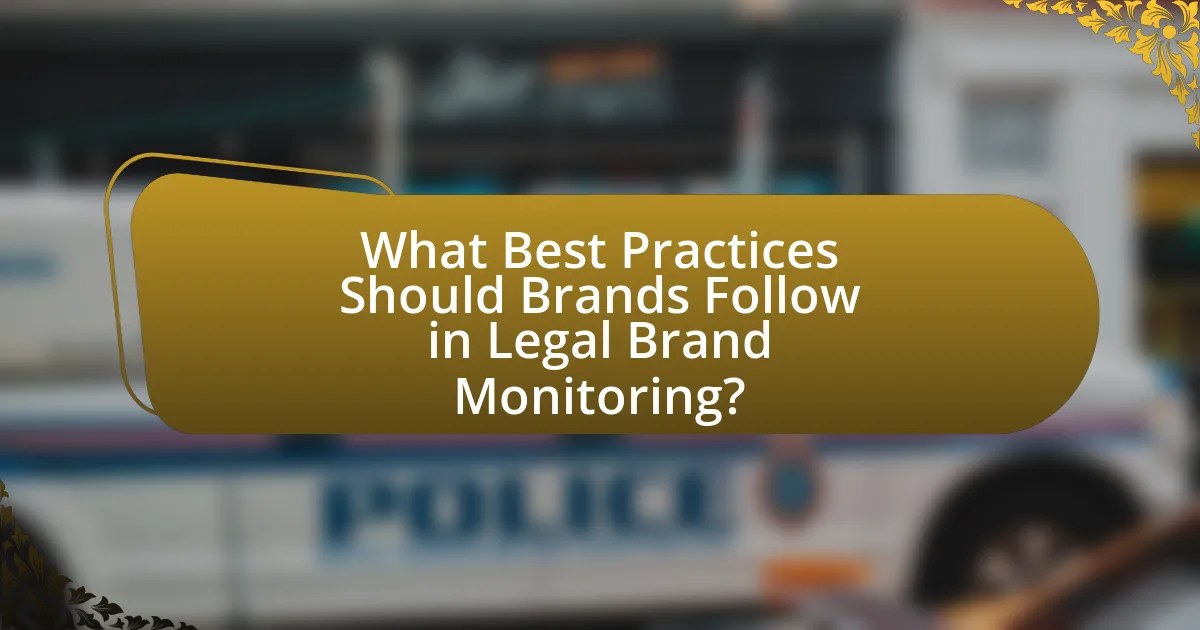The article focuses on the legal considerations in brand monitoring, emphasizing the importance of compliance with intellectual property laws, privacy regulations, and data protection statutes. It outlines the potential legal risks associated with brand monitoring, including trademark infringement, privacy violations, and defamation claims. Key legal frameworks governing brand monitoring practices, such as the General Data Protection Regulation (GDPR) and the California Consumer Privacy Act (CCPA), are discussed, along with strategies for mitigating legal risks and ensuring compliance. The article also highlights best practices for safeguarding intellectual property and adapting monitoring strategies in response to legal changes, providing essential insights for companies engaged in brand management.

What are the Legal Considerations in Brand Monitoring?
Legal considerations in brand monitoring include compliance with intellectual property laws, privacy regulations, and data protection statutes. Companies must ensure that their monitoring practices do not infringe on trademarks or copyrights, as unauthorized use of protected content can lead to legal disputes. Additionally, adherence to privacy laws, such as the General Data Protection Regulation (GDPR) in Europe, is crucial; organizations must obtain consent before collecting personal data from individuals. Violating these regulations can result in significant fines and reputational damage. Therefore, understanding and navigating these legal frameworks is essential for effective and lawful brand monitoring.
Why is understanding legal considerations important for brand monitoring?
Understanding legal considerations is crucial for brand monitoring because it helps companies navigate potential legal risks associated with intellectual property, advertising regulations, and consumer protection laws. Companies that monitor their brand must ensure compliance with trademark laws to avoid infringement, as failure to do so can result in costly litigation and damage to brand reputation. For instance, a study by the International Trademark Association found that 75% of businesses experienced trademark disputes, highlighting the importance of proactive legal awareness in brand management.
What legal frameworks govern brand monitoring practices?
Brand monitoring practices are governed by various legal frameworks, primarily including intellectual property law, privacy law, and consumer protection law. Intellectual property law, such as trademark law, protects brand names and logos from unauthorized use, ensuring that brand monitoring does not infringe on these rights. Privacy laws, including the General Data Protection Regulation (GDPR) in Europe and the California Consumer Privacy Act (CCPA) in the United States, regulate how personal data can be collected and used during brand monitoring activities. Consumer protection laws ensure that brand monitoring practices do not engage in deceptive or unfair practices that could mislead consumers. These legal frameworks collectively establish the boundaries within which companies must operate when monitoring their brands.
How do these legal frameworks impact brand monitoring strategies?
Legal frameworks significantly impact brand monitoring strategies by dictating the permissible methods of data collection and analysis. Compliance with regulations such as the General Data Protection Regulation (GDPR) in Europe requires brands to obtain explicit consent from consumers before collecting personal data, which can limit the scope of monitoring activities. Additionally, intellectual property laws influence how brands can track and respond to unauthorized use of their trademarks or copyrighted materials online. For instance, the Digital Millennium Copyright Act (DMCA) provides a legal pathway for brands to address copyright infringement, thereby shaping their monitoring strategies to include proactive measures against potential violations. These legal considerations necessitate that brands adapt their monitoring approaches to ensure compliance, which can lead to increased operational costs and the need for specialized legal expertise.
What are the potential legal risks associated with brand monitoring?
The potential legal risks associated with brand monitoring include violations of privacy laws, intellectual property infringement, and defamation claims. Brand monitoring often involves collecting data from social media and other online platforms, which can lead to breaches of privacy regulations such as the General Data Protection Regulation (GDPR) in Europe, where unauthorized data collection can result in significant fines. Additionally, if brand monitoring involves using copyrighted material or trademarks without permission, it may lead to intellectual property disputes. Furthermore, if the monitoring results in the dissemination of false or misleading information about a competitor or individual, it could trigger defamation lawsuits. These legal risks highlight the importance of adhering to relevant laws and regulations while conducting brand monitoring activities.
What types of legal issues can arise from improper brand monitoring?
Improper brand monitoring can lead to several legal issues, including trademark infringement, false advertising claims, and violations of consumer protection laws. Trademark infringement occurs when a brand fails to monitor and protect its trademarks, allowing unauthorized use that can confuse consumers. False advertising claims may arise if a brand inaccurately represents its products or services due to a lack of oversight, leading to potential lawsuits from competitors or consumers. Additionally, violations of consumer protection laws can occur if a brand does not adequately monitor customer feedback and complaints, resulting in misleading practices that harm consumers. These legal issues underscore the importance of diligent brand monitoring to mitigate risks and ensure compliance with relevant laws.
How can companies mitigate these legal risks?
Companies can mitigate legal risks by implementing comprehensive compliance programs and conducting regular audits. These programs should include training employees on relevant laws and regulations, such as intellectual property rights and data protection laws, to ensure adherence. Regular audits help identify potential legal vulnerabilities, allowing companies to address issues proactively. For instance, a study by the Association of Corporate Counsel found that organizations with robust compliance programs experience 50% fewer legal disputes. This evidence underscores the effectiveness of proactive measures in reducing legal risks.
What role does data privacy play in brand monitoring?
Data privacy is crucial in brand monitoring as it ensures compliance with legal regulations and protects consumer information. Companies must navigate laws such as the General Data Protection Regulation (GDPR) and the California Consumer Privacy Act (CCPA), which mandate transparency in data collection and usage. Violating these regulations can lead to significant fines and damage to brand reputation. For instance, a 2020 report indicated that companies faced an average fine of €88 million for GDPR violations, highlighting the financial risks associated with non-compliance. Thus, prioritizing data privacy not only safeguards consumer trust but also mitigates legal risks in brand monitoring activities.
What are the key data privacy laws relevant to brand monitoring?
The key data privacy laws relevant to brand monitoring include the General Data Protection Regulation (GDPR), the California Consumer Privacy Act (CCPA), and the Personal Information Protection and Electronic Documents Act (PIPEDA). The GDPR, effective since May 2018, regulates data protection and privacy in the European Union, imposing strict guidelines on data collection and processing, which directly impacts brand monitoring activities that involve personal data. The CCPA, enacted in January 2020, provides California residents with rights regarding their personal information, influencing how brands can monitor and analyze consumer data in that state. PIPEDA, applicable in Canada, governs how private sector organizations collect, use, and disclose personal information in the course of commercial activities, thereby affecting brand monitoring practices in Canada. These laws collectively shape the legal landscape for brand monitoring by establishing requirements for consent, transparency, and data protection.
How can brands ensure compliance with data privacy regulations?
Brands can ensure compliance with data privacy regulations by implementing robust data governance frameworks that include regular audits, employee training, and clear privacy policies. These frameworks help brands identify and mitigate risks associated with data handling, ensuring adherence to regulations such as the General Data Protection Regulation (GDPR) and the California Consumer Privacy Act (CCPA). For instance, a study by the International Association of Privacy Professionals (IAPP) found that organizations with comprehensive data governance practices are 50% more likely to achieve compliance with privacy laws.

How do Intellectual Property Laws Affect Brand Monitoring?
Intellectual property laws significantly influence brand monitoring by providing legal frameworks that protect trademarks, copyrights, and patents. These laws enable brands to identify and address unauthorized use of their intellectual property, ensuring that their brand identity remains intact and that consumers are not misled. For instance, trademark law allows companies to take legal action against counterfeit products or brand impersonation, which is essential for maintaining brand reputation and consumer trust. Additionally, copyright laws protect original content, enabling brands to monitor and control the use of their creative works across various platforms. This legal protection is crucial for brands to safeguard their assets and maintain competitive advantage in the marketplace.
What types of intellectual property are relevant in brand monitoring?
The types of intellectual property relevant in brand monitoring include trademarks, copyrights, and trade secrets. Trademarks protect brand names, logos, and slogans, ensuring that consumers can identify the source of goods or services. Copyrights safeguard original works of authorship, such as advertising materials and promotional content, preventing unauthorized use. Trade secrets encompass confidential business information that provides a competitive edge, such as marketing strategies and customer lists. These forms of intellectual property are crucial for maintaining brand integrity and preventing infringement, as they legally empower brands to take action against unauthorized use or imitation.
How can trademark laws influence brand monitoring practices?
Trademark laws significantly influence brand monitoring practices by establishing legal frameworks that protect brand identity and prevent infringement. These laws compel businesses to actively monitor their trademarks to ensure that unauthorized use does not dilute their brand or mislead consumers. For instance, the Lanham Act in the United States provides a basis for trademark protection, requiring companies to demonstrate that they are vigilant in monitoring their trademarks to maintain their rights. Failure to monitor can lead to loss of trademark rights, as seen in cases where brands have lost protection due to non-use or lack of enforcement against infringers. Thus, trademark laws necessitate robust brand monitoring strategies to safeguard brand integrity and legal standing.
What are the implications of copyright laws for brand monitoring?
Copyright laws significantly impact brand monitoring by establishing the legal framework within which brands can protect their intellectual property. These laws dictate how brands can monitor and respond to unauthorized use of their copyrighted materials, such as logos, advertisements, and promotional content. For instance, brands must ensure that their monitoring practices do not infringe on the copyright of others, which could lead to legal disputes. Additionally, copyright laws allow brands to take action against infringers, thereby safeguarding their reputation and market position. The Digital Millennium Copyright Act (DMCA) provides a mechanism for brands to issue takedown notices against infringing content online, reinforcing the importance of compliance with copyright regulations in brand monitoring efforts.
How can brands protect their intellectual property during monitoring?
Brands can protect their intellectual property during monitoring by implementing robust legal frameworks, including trademark registrations and copyright protections. These legal measures establish ownership and provide a basis for action against infringement. For instance, registering trademarks with the United States Patent and Trademark Office (USPTO) grants brands exclusive rights to their logos and names, making it easier to pursue legal action against unauthorized use. Additionally, brands should utilize monitoring tools to track potential infringements across various platforms, enabling timely responses to violations. According to a report by the International Trademark Association, proactive monitoring can reduce the risk of brand dilution and unauthorized use, reinforcing the importance of vigilance in protecting intellectual property.
What strategies can be employed to safeguard trademarks and copyrights?
To safeguard trademarks and copyrights, businesses can employ strategies such as registering their trademarks and copyrights with the appropriate governmental authorities, conducting regular monitoring for potential infringements, and enforcing their rights through legal action when necessary. Registration provides legal recognition and strengthens the ability to defend against unauthorized use, as seen in cases where registered trademarks have been upheld in court, reinforcing the importance of formal registration. Regular monitoring, including online searches and market surveillance, helps identify potential infringements early, allowing for timely action. Legal enforcement, including cease-and-desist letters and litigation, serves as a deterrent against infringement and protects the integrity of the brand.
How can brands respond to potential infringements identified through monitoring?
Brands can respond to potential infringements identified through monitoring by taking immediate legal action, such as sending cease-and-desist letters to the infringing parties. This approach is effective as it formally notifies the infringer of the violation and demands that they stop the infringing activity. According to a study by the International Trademark Association, proactive enforcement of trademark rights through such legal measures can significantly reduce instances of infringement and protect brand integrity. Additionally, brands may consider filing a complaint with relevant authorities or pursuing litigation if necessary, which further reinforces their commitment to protecting their intellectual property rights.

What Best Practices Should Brands Follow in Legal Brand Monitoring?
Brands should implement a comprehensive strategy that includes regular monitoring of trademarks, vigilant tracking of online mentions, and proactive engagement with legal counsel. Regular monitoring of trademarks ensures that brands can identify potential infringements early, allowing for timely legal action. Tracking online mentions helps brands understand how their name and products are being used, which can reveal unauthorized uses or misleading representations. Engaging with legal counsel ensures that brands are informed about the latest legal developments and can navigate complex intellectual property laws effectively. These practices are essential for protecting brand integrity and minimizing legal risks.
What are the essential best practices for legal compliance in brand monitoring?
The essential best practices for legal compliance in brand monitoring include obtaining consent for data collection, adhering to privacy laws, and ensuring accurate representation of brand usage. Organizations must secure explicit permission from individuals before collecting or analyzing their data, as mandated by regulations like the General Data Protection Regulation (GDPR). Compliance with privacy laws, such as the California Consumer Privacy Act (CCPA), is crucial to avoid legal repercussions. Additionally, brands should accurately represent their products and services in monitoring efforts to prevent misleading claims, which can lead to legal challenges. These practices collectively safeguard against legal risks while maintaining ethical standards in brand monitoring.
How can brands develop a legal monitoring policy?
Brands can develop a legal monitoring policy by establishing a framework that includes identifying relevant laws, regulations, and industry standards that impact their operations. This involves conducting a comprehensive risk assessment to understand potential legal issues related to brand monitoring, such as intellectual property rights, data privacy laws, and advertising regulations.
Furthermore, brands should implement regular training for employees on legal compliance and monitoring practices, ensuring that all team members are aware of the legal landscape. Utilizing technology tools for automated monitoring can also help in tracking compliance with legal requirements efficiently.
Evidence of the importance of such policies can be seen in the increasing number of legal disputes related to brand infringement and data breaches, which have risen by 30% over the past five years, highlighting the necessity for proactive legal monitoring strategies.
What tools and resources can assist in maintaining legal compliance?
Legal compliance can be maintained using tools such as compliance management software, legal research databases, and regulatory tracking systems. Compliance management software, like LogicManager or ComplyAdvantage, helps organizations track regulations and manage compliance processes efficiently. Legal research databases, such as Westlaw or LexisNexis, provide access to legal information and case law, enabling businesses to stay informed about relevant laws. Regulatory tracking systems, like Compliance.ai, offer real-time updates on regulatory changes, ensuring that organizations can adapt promptly to new legal requirements. These tools collectively enhance an organization’s ability to navigate the complex legal landscape effectively.
How can brands stay updated on legal changes affecting brand monitoring?
Brands can stay updated on legal changes affecting brand monitoring by subscribing to legal newsletters, following industry-specific legal blogs, and participating in relevant webinars. These resources provide timely updates on legislation and case law that impact brand monitoring practices. For instance, organizations like the American Bar Association and the International Trademark Association regularly publish insights on intellectual property law changes, which are crucial for brands to monitor. Additionally, engaging with legal professionals who specialize in brand law can offer tailored advice and updates, ensuring brands remain compliant with evolving regulations.
What resources are available for tracking legal developments in brand monitoring?
Resources available for tracking legal developments in brand monitoring include legal databases, industry publications, and regulatory agency websites. Legal databases such as Westlaw and LexisNexis provide comprehensive access to case law, statutes, and legal news relevant to brand monitoring. Industry publications like the International Trademark Association (INTA) and the American Bar Association (ABA) offer insights and updates on trademark law and brand protection. Additionally, regulatory agency websites, such as the United States Patent and Trademark Office (USPTO), provide official updates on trademark registrations and legal changes affecting brand monitoring. These resources collectively ensure that stakeholders remain informed about the evolving legal landscape surrounding brand monitoring.
How can brands adapt their monitoring strategies in response to legal changes?
Brands can adapt their monitoring strategies in response to legal changes by implementing real-time compliance tracking systems. These systems enable brands to continuously assess their practices against evolving regulations, ensuring adherence to laws such as data protection and advertising standards. For instance, the General Data Protection Regulation (GDPR) mandates strict data handling protocols, prompting brands to enhance their monitoring of customer data usage and consent management. By utilizing automated tools that flag non-compliance issues, brands can proactively adjust their strategies, thereby minimizing legal risks and maintaining consumer trust.
What practical tips can brands implement for effective legal brand monitoring?
Brands can implement several practical tips for effective legal brand monitoring, including establishing a comprehensive monitoring system, utilizing automated tools, and regularly reviewing trademark registrations. A comprehensive monitoring system allows brands to track unauthorized use of their trademarks across various platforms, ensuring timely identification of potential infringements. Automated tools, such as web crawlers and social media monitoring software, can efficiently scan the internet for brand mentions and potential violations, significantly reducing manual effort. Regularly reviewing trademark registrations helps brands maintain their legal rights and ensures that their trademarks are not at risk of becoming generic or abandoned. According to the International Trademark Association, proactive monitoring can prevent costly legal disputes and protect brand integrity.

Leave a Reply